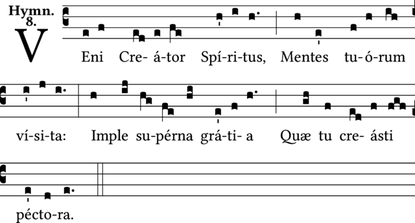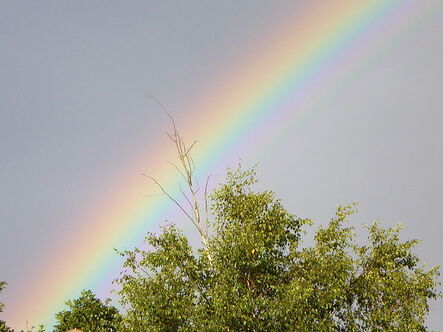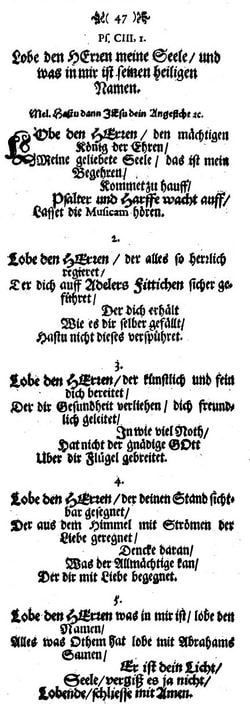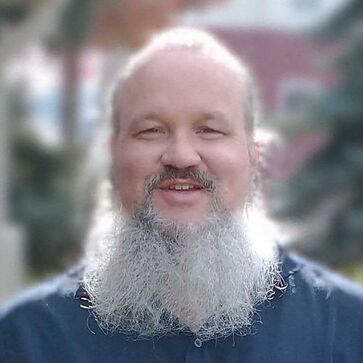 By Original transcriber: Andrew Hinkley - https://gregobase.selapa.net/chant.php?id=2923, CC0, https://commons.wikimedia.org/w/index.php?curid=59092620 By Original transcriber: Andrew Hinkley - https://gregobase.selapa.net/chant.php?id=2923, CC0, https://commons.wikimedia.org/w/index.php?curid=59092620 Veni Creator Spiritus. Come, Creator Spirit. This 9th century text is attributed Rabanus Maurus, a Frankish Benectine monk who was later to become the Archbishop of Mainz. When sung, it is traditionally to Gregorian Chant and prescribed for the feast of Pentecost and additional select occasions. The tune has been set by a myriad of composers over the centuries including French Baroque organist and composer Nicolas de Grigny. From his singular collection of organ works Premier livre d'orgue (1699), two versets from "Veni Creator" will be heard this Pentecost Sunday. The opening "En Taille a 5" is set for five voices with the chant melody played in the tenor ("taille") on a prominent pedal reed stop. The last movement, "Dialogue sur les grands jeux," displays the characteristic nasally French reeds in an opening and closing overture with a sprightly gigue between. Violinist Amy Welsh offers the "Allegro con brio" from Violin Sonata in D Major by George Frideric Handel. Composed in 1749-50, this was Handel's final piece of chamber music before his death in 1757. An expression of joy in D major: the key most associated by Baroque composers as the "Key of God."
0 Comments
 CC BY 3.0, https://commons.wikimedia.org/w/index.php?curid=27869410 CC BY 3.0, https://commons.wikimedia.org/w/index.php?curid=27869410 This Sunday morning we worship in the style of our 6:00 p.m. service! Spiritual songs of joy and praise reveling in the images of God will be experienced at the 11:00 hour. Kacey Musgraves' "Rainbow" was released in 2018 and soon became an anthem for all who have struggled. Especially embraced by the LGBTQ community, it has now resurged as a balm in this pandemic era, recently performed by Kacey on the Global Citizen "One World:Together at Home" benefit concert. The chorus offers these words of comfort and optimism: "Hold tight to your umbrella, well darlin’ I’m just trying to tell ya, that there’s always been a rainbow hanging over your head.” "No Longer" is a hymn text about unity written by a fave here at Plymouth, Carolyn Winfrey Gillette. Paired with the traditional Yigdal melody "Leoni," this musical offering will receive a jazz-inflected reinterpretation. "Yahweh" is a song by the Irish rock band U2 appearing on their 2004 album "How to Dismantle an Atom Bomb." Described as a "closing prayer" to the record, the song took on a new life in the recording process when lead singer Bono spontaneously sang the lyrics and melodies in one take. He further noted, "I had this idea that no one can own Jerusalem, but everybody wants to put flags on it. The title's an ancient name that's not meant to be spoken. I got around it by singing. I hope I don't offend anyone." Guitarist Alan Skowron and bassist Peter Strening join Blair and I for this "6 at 11" worship experience. We hope you may be present with us as well. Selah.  By Joachim Neander - Joachim Neander: Glaub- und Liebes-Übung: Auffgemuntert durch Einfältige Bundes-Lieder und Danck-Psalmen, Wesel/Duisburg/Frankfurt 1686, S. 47+49, Public Domain, https://commons.wikimedia.org/w/index.php?curid=37964582 By Joachim Neander - Joachim Neander: Glaub- und Liebes-Übung: Auffgemuntert durch Einfältige Bundes-Lieder und Danck-Psalmen, Wesel/Duisburg/Frankfurt 1686, S. 47+49, Public Domain, https://commons.wikimedia.org/w/index.php?curid=37964582 Wordless expressions of a blessed Christian community through ordered sound: music. An invocation. A hosannah. A hymn of praise. "Nun bitten wir den Heiligen Geist" (We Now Implore the Holy Ghost) was composed by Martin Luther in 1524 and based on a well-known medieval leise (a 13th century vernacular church song). Numerous settings of this tune were composed in the centuries to follow including this week's ornamented chorale prelude by Dietrich Buxtehude (1637-1707). An expressive invitation to the Holy Spirit as we enter worship. Robert Borger plays Franz Liszt's heroic "Hosannah" (1862) scored for trombone and organ. Based on the chorale melody "Heilig ist Gott der Vater" (Holy is God the Father), the work is an instrumental setting of "Alleluja" from Liszt's large scale choral work "Cantico del sol Francesco d'Assisi." An acclamation of joy and triumph. The hymn of praise "Lobe den Herren, den mächtigen König der Ehren" (Praise to the Lord, the Almighty) is a shared treasure across denominational lines the world over. Paul Manz's celebrated setting from 1975 perfectly encapsulates the fervent spirit of this venerable text: Bold. Rousing. Enlivening. |
Details
|

 RSS Feed
RSS Feed